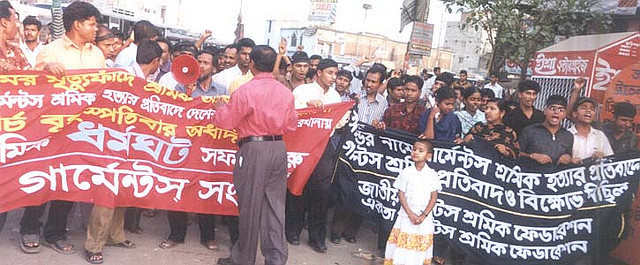"Political unrest poses dire risk to country's economy"
February 12th, 2014Bangladesh faces serious economic consequences from ongoing political unrest, writes Asif Reza Akash, 22, a Correspondent from Dhaka in Bangladesh, who says strikes are taking a toll in rising prices and lost income.
Bangladesh has passed its tenth national parliamentary election under an amended constitution. The previous opposition and major political party BNP and its alliance boycotted the election and put the country under continuous strikes from the early part of October 2013.
The economy suffered from this political turmoil, without any doubt. Bangladesh was stagnant for two or three months and surely lagged behind countries such as India, Vietnam, China, and Myanmar in terms of trade, commerce and export.
Garments and textiles, Bangladesh’s biggest sector, has virtually been ruled out of competition as a global exporter country for those turbulent months. Food security has been threatened. Production and investment is clearly facing a downward move. The flow of remittance has declined and watchdog organizations like the World Bank and IMF have expressed their deep concern.
In the fiscal year 2013-14, the GDP was anticipated to grow 7.2 per cent, but current World Bank estimates are just 5.7 per cent. Individual-level investment has reportedly been reduced by one to two per cent. Manpower export has receded, which could have a negative impact on remittance inflow.
The textile sector already suffered an image crisis with the Tazreen fire and the RanaPlaza collapse, but the political unrest has destroyed the resilience of this sector. Many import orders from European delegates have been placed in India, Vietnam and other countries instead of Bangladesh. Coming up in June there will be a review of the garment sector by the European Union and if Bangladesh loses, it will be fatal for the textile sector. Though Bangladesh is second in garments export it can lose its position at any time if further actions are not taken. Bangladesh’s Garment Manufacturers and Exporters Association (BGMEA) president claimed that the sector incurred a loss of over Tk. 2,000 crore in the street violence of October and November, while orders worth $2.40 million were cancelled from December 1 to 9.
The banking sector is at a halt now. Newspaper reports show that 28,000 crore taka is deposited idle in bank vaults. Loan supplies, repayment, and banking services have been facing a standstill. Even the world recession of 2008 didn’t affect the banking industry as much as the on-going political unrest did. China’s industry offered to invest ten billion USD in Bangladesh, but later postponed on the grounds of political instability. An important Memorandum of Understanding (MoE) was about to be signed between the UAE and Bangladesh on November 03 but was postponed later for the same reason (Dr. Mijanur Rahman Shelly, 03/12/2013, Bonik Barta).
The worldwide inflationary trend showcases a downfall recently as international food prices have fallen, but here in Bangladesh food prices have increased because of the nationwide blockade. Food carriers have been attacked in many places, which reduces the supply of food in urban areas. As a result prices go up. The transportation charge has increased at least threefold as driving during the strikes involves a high level of risk. In many parts of the country, especially north Bengal, farmers became unable to transport foods and grains to the cities and were deprived of their rightful price. This is how political unrest is forcing city dwellers to buy food at a higher price and keeping the farmers from realizing proper income.
The transportation business has suffered greatly. Almost every day, there have been attacks and torchings of cars and buses. From highway to streets there was and still is a continuous tension. A report in BSS (Bangladesh Songbad Songstha) states that “unruly protesters damaged over 350 motor vehicles and torched 325 others at different places of the country during the period from November 25 to December 11”. The same report says “310 violent and sabotage attacks were posed on railway coaches causing a loss of Tk. 10 crore during the period from October 10 to December 9, 2013”.
It is imperative to mention here that, although Bangladesh is advancing and the per capita GDP has risen, a great number of people still live hand to mouth. The rickshaw pullers, CNG drivers, hawkers and many classes of people depend on a meagre daily income. The continuous strike and nationwide blockade has forced them into deprivation. According to Atiqul Islam, President of BGMEA, about five million people working in the RMG sector suffer a loss of Tk. 250 crore on each day of the blockade.
The economy has faced a disaster in this turmoil. Though academically politics and economics are different majors, we must see them as an intertwining subject. The economy cannot go a single step further without proper politics. We cannot afford an economic setback at this juncture, as Bangladesh wants to be a middle income country within the least possible time. The sooner the politicians admit this fact the better it is for the country’s people.
photo credit: dblackadder via photopin cc
………………………………………………………………………………………………………………
About me: I am a graduate student in Accounting & Information Systems, University of Dhaka in Bangladesh, and work as a research assistant at the Center for Bangladesh Studies. I write on contemporary socio-economic and political issues for English daily newspapers in Bangladesh. Politics, economics and energy are three of my interests. Movies, music, books and hanging out with friends are my pursuits. I dream of traveling the world and exploring different cultures.
Find me on Twitter @ and read my blog at www.asifreza.blogspot.com
………………………………………………………………………………………………………………
Opinions expressed in this article are those of the author and do not necessarily represent the views of the Commonwealth Youth Programme. Articles are published in a spirit of dialogue, respect and understanding. If you disagree, why not submit a response?
To learn more about becoming a Commonwealth Correspondent please visit:
http://www.yourcommonwealth.org/submit-articles/commonwealthcorrespondents/
………………………………………………………………………………………………………………







